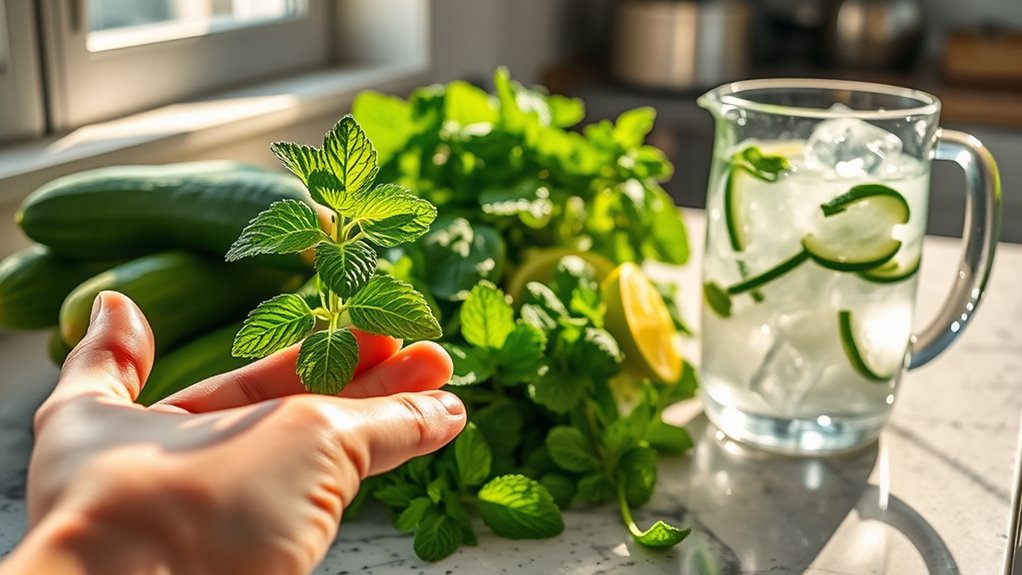No More Swelling! This Simple Kitchen Hack Works Wonders!
Understanding Swelling: Causes and Symptoms
Swelling can occur for various reasons, and it often signals an underlying issue in your body. You might notice it after an injury, due to allergies, or even from prolonged sitting.
Understanding these causes helps you connect with your body’s signals. Symptoms like pain, redness, or warmth can accompany swelling, making it crucial to pay attention.
If you’re looking for a simple way to address this, a reduce swelling hack can make a difference. Elevating the affected area or applying a cold compress can provide relief.
Top Kitchen Ingredients That Fight Inflammation
When you’re looking to combat inflammation, your kitchen might hold some powerful allies. Ingredients like turmeric, with its active compound curcumin, can work wonders. Ginger’s natural anti-inflammatory properties also make it a must-have. Olive oil, rich in healthy fats, can help reduce swelling too. Don’t forget about garlic, which not only adds flavor but also packs a punch against inflammation. Additionally, kitchen herbs like ginger and turmeric can naturally reduce inflammation, making them excellent choices for your meals. Certain herbs and botanicals like turmeric and ginger contain compounds that mimic the body’s pain-relieving substances. Berries, loaded with antioxidants, are perfect for snacking. Incorporating these ingredients into your meals can foster a sense of community and wellness. Together, you and your kitchen can create a healing environment that supports your body’s needs. Additionally, combining these ingredients with anti-inflammatory foods can further enhance your overall health.
Easy Remedies: Step-by-Step Instructions
To effectively reduce swelling using kitchen remedies, you can follow some simple steps that utilize the power of everyday ingredients. Here’s a quick guide to get started:
| Ingredient | How to Use | Frequency |
|---|---|---|
| Turmeric | Mix with water to form a paste and apply to swollen areas. | Twice daily |
| Ginger | Brew in hot water and sip. | Once daily |
| Epsom Salt | Dissolve in warm water for a soak. | As needed |
Additionally, utilizing Epsom salt in warm water not only helps to reduce inflammation but also improves circulation, which can further enhance your results. This is due to its ability to draw excess fluid from tissues through osmosis. Swollen feet can often be linked to excess salt intake, so be mindful of your diet. Try these remedies, and you’ll feel a noticeable difference. Embrace the healing power of your kitchen!
Lifestyle Changes to Prevent Swelling
Incorporating a few lifestyle changes can significantly reduce your chances of experiencing swelling. You don’t have to feel isolated in this struggle; small adjustments can make a big difference.
-
Stay Hydrated: Drinking enough water helps flush out excess sodium, reducing fluid retention. Staying adequately hydrated is critical to prevent dehydration, which can worsen swelling. Proper hydration also maintains gut health, which can influence overall fluid balance.
-
Limit Salt Intake: Cutting back on salty foods can prevent your body from holding onto extra water.
-
Regular Movement: Engaging in daily physical activity improves circulation, helping to reduce swelling. Additionally, poor circulation can be a contributing factor to swelling, so focusing on movement is essential.
Embrace these changes together with others on the same journey, and you’ll foster a supportive environment for lasting wellness!
When to Seek Medical Attention
How can you tell if your swelling is a sign of something more serious?
If you notice sudden swelling, especially in your legs or face, or if it’s accompanied by pain, redness, or warmth, it’s time to seek medical attention. Additionally, swelling can sometimes be related to allergy triggers such as certain foods, which may require immediate evaluation.
Don’t ignore swelling that lasts more than a few days or keeps getting worse.
If you struggle to breathe or feel faint, call for help immediately.
Remember, you’re not alone in this; reaching out for advice shows strength.
Trust your instincts—if something feels off, it’s always better to get checked out.
Additionally, be aware that certain warning signs indicate the need for immediate medical evaluation.
Your health deserves priority.
